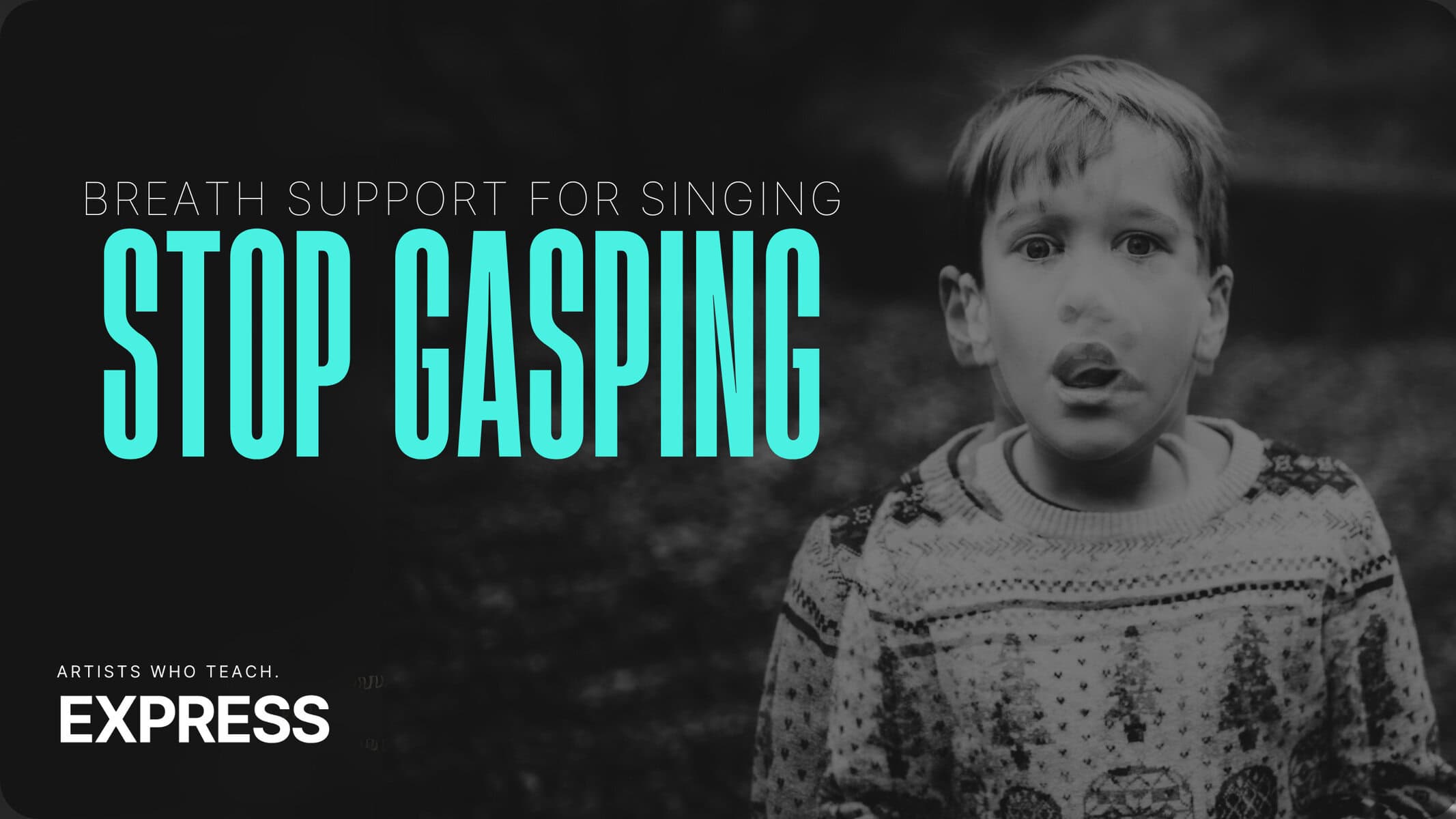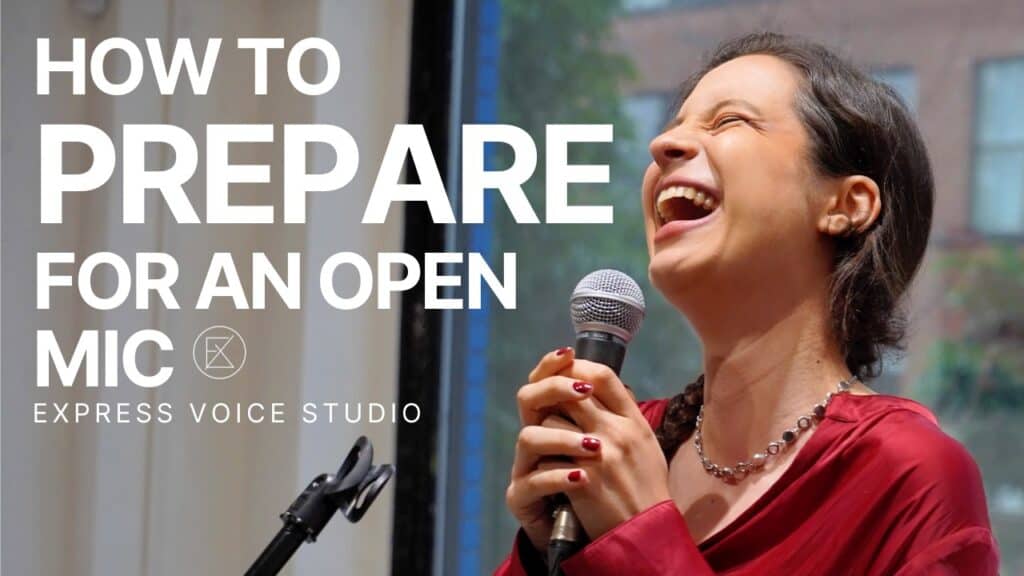Your breath is the foundation of a beautiful sound. How often do you notice yourself hearing your friends breathe, or your own breathing? Unless you both have just completed an intensive circuit of Cross-Fit, you are probably not aware of your breath very often. Why then, do some singers make an audible gasps when taking in breath to sing?
In this blog, we will show you how to improve breath control, explain why gasping while singing happens to some singers and not others, and give you some of the EXPRESS voice teacher’s favourite breathing exercises.
Looking for a coach to assess your voice? Reach out and we can hook you up with an Artist who knows all about breath control.

What Is A Gasp?
The sound of someone gasping is defined as, “the strain to take a deep breath.” One of the most obvious- and loudest- ways to check if your breathing is… messed up… is to record yourself and see if you gasp between phrases for air.
To put it a touch scientifically:
Gasping is the result of your body trying to take in air quickly, but fighting against its own tensions to do so. It is the complexity of your body mechanisms attempting to function together quickly.
Sorry to say guys, but this absolutely needs to be addressed.

How To Stop Gasping
Because a gasp is the result of tension in your body, the solution is to release this tension.
Simple enough.
Introducing breath control exercises can help you build endurance, control, and support for your diaphragm, which in turn helps you hit high notes and sustain long phrases.
However, your body considers these tensions essential to existence; without habitual tensions, your body believes it cannot produce the action you are demanding of it: standing, walking, sitting down, and of course, singing. For this reason, stopping yourself from gasping is not a matter of merely telling yourself not to do it. Rather, you must use Alexander Technique, breath control technique, and personalized vocal exercises to change the way your body supports itself while strengthening intercostal muscles (also called the singer’s support).
Will Any Kind Of Practice Work For Breath Control Training?
Isn’t it enough to just practice singing and it will go away on its own? Do you really need to be so strategic about how and what you practice?
I wish I could tell you yes! Please just go sing away and it will improve! But, then I would be a liar and the negative comments on this post would grow and grow.
And herein lies the frustrating truth about singing: No two bodies are the same, no two singing journeys are the same, and the speed at which you and Bob beside you progress are highly dependent on the extremity of your natural habits and whether your teacher understands exactly what your body needs. Let’s look at Bob as a case study to understand why just singing is not a solution to breath control.
A Singing Case Study: Bob v. You – Vocal Technique
Bob: A Case study on healthy singing
Bob has some nasty habits: His posture involves pulling his neck forward and down while his shoulders slump forward, and back curves over. As a result, his voice is compressed and his throat must work extra hard to create sound- this is why Bob finds it difficult to talk for extended lengths of time and gasps when he takes a quick breath.
Bob is going to have to change his posture entirely if he hopes to sing without pain and use his voice in a healthy way. Bob understands that he cannot use strength of will to force a good sound out of a twisted instrument and so goes to work with an Alexander Technique teacher for 8 weeks.
Alexander Technique teaches him how to change his relationship with his body so that when he goes to sing, he can change his habits to get the sound he wants. Bob also starts practicing breathing deeply and incorporates breathing exercises into his routine.
You: Vocal technique faux pas
Now lets maybe look at you? You are commended often on your posture, you exhume a regal air and are known for being able to project across large halls. It seems that all you need to work on is loosening some tension in your chest (likely established from holding that posture without an awareness of the space that should exist within your sternum and back even when standing straight!)
But luckily, you are not nearly as twisted as Bob. You take singing lessons focused solely on scales, trills, and sighs without any specific body work or Alexander Technique, but your teacher mentions you are a bit stiff and should try yoga. A few months later, you are a better singer with less tension and have achieved the goals you set out to.
This is a possible outcome! Alas, the story could easily go the other way, where the absence of body work has actually made you even tighter, and now you have lost your ability to project across large halls.Bob, who incorporated both body work and vocal exercises into his learning, now has a job as a voice-over artist for Disney.
What Should You do To Ensure You Improve And Stop Gasping?
Don’t leave anything to luck. Treat your body like a cellist treats his cello- keep it in top condition and watch for any broken strings. Work with a voice teacher who has training in Alexander Technique or another form of body work or complement your training with your current voice teacher by doing sessions with an Alexander Technician. Proper breathing technique is essential for maintaining vocal health and performance.
When you go into the practice room, go in as a detective. Spend time just breathing and preparing to sing- before you make sound, see where in your body you feel tight. Make notes and take this to your teacher. Lessons and practice times should be exploratory.
No one is inside your body but you, and if you try to improve as a singer by simply repeating the same act over and over again, you are neglecting the most obvious and yet forgotten fact: Your vocal folds play a crucial role in sound production and need to be coordinated with your breath.
Your body is your instrument. Mastering breath control is key to improving your vocal technique.
Be like Bob.

Diaphragmatic Breathing Exercises
Now that we understand why people gasp and the importance of body work for good breath control, lets check out some of the favourite breathing exercises for diaphragmatic breathing from our roster of Artists Who Teach.
Breathing Exercise 1: Release Tension
Find a comfortable and quiet place to sit or lie down.
Start with your toes and gradually work your way up, tensing and then releasing each muscle group. For example, tense your toes for a few seconds, then release and let the tension go.
Move to your feet, then your calves, thighs, and so on, until you reach your head and neck.
Focus on your breathing throughout the exercise, inhaling deeply as you tense your muscles and exhaling fully as you release the tension.
Pay attention to anything that tightens at the thought of singing- actively think about relaxing those areas before you start your exhale.
Breathing Exercise 2: Connect To Your Abdominal Muscles
Lie down on your back with your knees bent or sit comfortably in a chair with your shoulders relaxed.
Place one hand on your chest and the other on your abdomen.
Inhale deeply through your nose, allowing your abdomen to rise and expand while keeping your chest relatively still.
Start to breathe in for two counts, suspend two counts, and exhale for two counts.
Increase the breathing pattern by one count to 3, 3, and 3. Continue this pattern until you reach 8.
Breathing Exercise 3: Get Used To Expanding On The Exhale
Sit or stand comfortably, with a straight back and relaxed shoulders.
Inhale slowly and deeply through your nose, counting to three or four.
Exhale slowly and fully through your mouth, extending the exhale to a count of six or eight.
Focus on making the exhale longer and more relaxed than the inhale, feeling the expansion and release of tension with each exhale.
Focus on opening your lower back and see it expand as wide as the room as you exhale. This will help you to not collapse as you use your breath. Also watch that your shoulders do not sink. You can help this by taking your arms and lifting them slowly as you exhale to keep your rib cage expanded.

How To Know If You Are Doing Breathing Exercises Right
The breath control exercises we have recommended are focused on the work that takes place in your body before making sound. This way, you can’t run the risk of making your tensions worse.
If you are ready to take your breathing exercises into singing notes, we highly recommend working with a qualified teacher who can guide you through exploring your vocal range, supporting high notes with strong breath control, and point out any errors you are making such as taking in too much air or shallow breathing.








